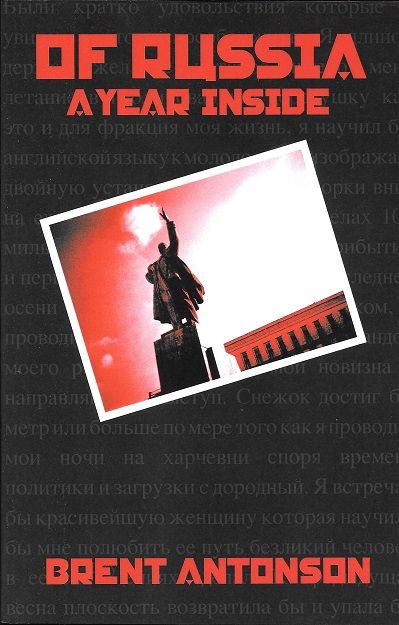English from the Outside
I was not built for teaching. I wanted to live in Russia. But that can only be achieved through a work permit. Teaching became my entrance visa.
Two decades ago I taught English for the first time in a city in Russia called Voronezh. I taught at the Institute of Law and Economics and the State University of the Russian Federation.
I only knew the best way to get familiar with a Russian city far from home; where things to be only left at home, you left at home, you left. Everything you brought, you brought. It was living "abroad".
Teaching was a challenge. Somedays I had all the correct answers, other days were so bad that even my personal math wouldn't add up. But my worst day working in Russia was better than my best days at home.
One night in a snowstorm I walked home from the university at dusk and stood alone at the foot of Lenin's statue in Lenin square. I look at his outstretched arm and commanding gaze. I wonder if he ever saw me in his ideology, a Canadian English teacher in a free, so to speak, the republic of Russia, ruled by yet another Russian tyrant. I crunched off in the snow.
I began by saying to tell my classes that English was a "bastard language", compiled of words, nouns, and verbs, that came from many distant lands.
I did give up this view because English is a very complex and nearly universally versatile language. English is very special. I learned the steep territory of the structure beneath it. I learned English as I taught English.
As I worked through photocopied workbooks, I learned much more about my own English abilities. And I learned how wrong I was about an English speaker's attention span. It seems that English was an intentional language, for expression, for the ability to transmit information, for uniting people, and in terms of notoriety, aiming to be the language of the world.
Do you know what a foreign accent is? It’s a sign of bravery.”
– Amy Chua
There were days when Tatyana, the second-year teacher (they often call themselves professors) would shake things up and ask if I would work the classes through the past-perfect, show them our system for contractions, or lecture on non-Euclidean grammar. My interest in languages helped me endure what would have been a savage and cruel thing were I not fascinated by the product.
I learned the night before or quite literally in class, just what the class was learning. One night a student dropped by my apartment. Nastya rang my bell and asked if I could ‘check her passive voice’. And so, I learned the passive voice…
It is a funny thing that we use our language skills without the honor, respect, and courtesy they deserve. We seem to run across English puddles in our brains. We skim across an almost endless history in the chosen language.
It is strange that a social drop-out can beg for change on a Canadian street using a free range of participles, tenses, and declensions, asking for spare change without pride in it all. English is a phenomenal language to communicate every obscurity our human minds can come up with. Other languages can run out of explanatory nature.
In Russia, our language is the golden ring. In Russia, the students were engaged in my classes and getting quicker and sharper daily; they wanted, needed, and were striving for the careless way English speakers speak. The way native English speakers interact with everything in everyday life is taken for granted. From choosing movies to reading road signs, English governs our every moment. We are so immersed that we don't stand back and see the wonder of it all!
The students wanted my language, my dialect, my colloquial speech, and my slang. Every time I wrote something on the chalkboard, they had to recognize it and absorb it if they wanted to surf websites, watch a Hollywood blockbuster without mismatched lips, or become an air traffic controller. English is where the world’s at; to them it was essential. And to attain fluency is their dream.
I was surrounded by Russian. If I want to run down and grab a drink, buy a lopsided loaf of bread, or I happen to run into the school’s president at the urinals, I must communicate in Russian. It was such an adventure to communicate the daily essentials in another language! The daily basics of "good morning" ect happened many times a day in Russian, I loved the interactions and exchanges of dialogue.
I was such an oddity in Voronezh that old people stopped me and asked to see proof I was from Canada. They are old Soviets and haven’t seen a foreigner since the Germans in ’45.

Everything around me was in Russian; everything was in an alphabet that is exciting and enigmatic. The Russian alphabet consists of 33 letters: 21 consonants, 10 vowels, and two letters without sound. 10 Greek, 10 Latin-based, 10 secret Russian symbols.
"Я случайно Русский язык очень сложный для изучения, но оно того стоит..." means "I think Russian is a difficult language to learn. But it’s worth it."
To have another language is to possess a second soul.”
– Charlemagne
As I learned Russian, I climbed into a language whose words are out of familiar order, which had new stresses and syntax and modifications for gender that were beyond me. I realized the challenges in the minds of my students. As they learned from me, I learned from them.
When I was living in Estonia, I watched Russian signs come down as independence took hold. Estonian was in Roman script and the language didn’t have much future as it was very difficult and spoken by a small segment of the world’s population. But Russian contained an enchanting potential, a secret door. After four years of self-study, night courses, and a trip across Siberia, I still had to work it; I needed to use Russian to live.

I could no longer see English as a regular Canadian does. My daily thoughts were no longer simple tasks. If I wasn’t teaching English structure to classes, I was speaking in French with Lucia. She is the Italian teacher but who spoke French as a Second language, as do I, so we spoke copious amounts of broken French. for hours a night - or I was trying out my Russian on people. I couldn’t speak to anyone in plain ole’ everyday English.
I had to see myself as the only person in Voronezh who knew why a British accent can sound pompous or snobby, what Bugs Bunny really means when he says ‘Nya, what’s up, doc’, and who could tell a Bronx accent from a Mississippi one.
I can see English as a bubble of words. I was walking in a world of tongues — I had girlfriends overseas... I said "I love you" to three different women meaning it in three different ways. One was as a worldly father figure, another was as a best friend and the last was as a lover.
Language exerts hidden power, like the moon on the tides.”
–Rita Mae Brown
I thought about the typical Canadian city buzzing about. The supermarket, bookstores, the notary public, a drive-thru; how easy it all is. The fleeting simplicity in watching a movie, reinstalling an operating system, reading a book, or asking for an empty cup because the first is too hot, is truly a gift.
Our mouths and tongues move in a manner that leaves little misunderstood. We can deal with a variety of broken English accents.
I have a great example of why English was built to be strong, to go where no other languages have gone before. There are no accents in English, maybe just the umlauts purposely left in naïve... we are also spared the horrors and rigors of a grammatical gender-based language as all other Romance languages have masculine, feminine and neuter forms of nouns and articles.
The glory of not having to remember all of these features that most languages have is an incredible linguistical feat. Native English speakers have that little area of understanding used for something entirely different from those who are hardwired to learn languages.
English is a unique product. Spread mainly by missionaries and colonialists, it did spread as media from the West grew far more technical and educated and as scribes and taxonomists gave out names. During the Cold War, the East was doomed to collapse in the 1991 Soviet Dismantling. The internet came through and cracked Cold countries wide open.
Using Sanskrit as an example from Wikipedia of the difficulties of a limited language: The Classical form of the language simplified the rules but retained various aspects of the Vedic language while adding rigor and flexibilities so that it had sufficient means to express thoughts as well as being "capable of responding to the future increasing demands of an infinitely diversified literature".
The challenges faced by Hebrew (a language God Himself created) were that for all its glory, it needed an upgrade and to transcend the difficulties of incorporating new world ideas versus what sustains language needs, flexibility, and lots of it. The need for words was never so great in various epochs and ages. The latest was the dot-com bubble which made us crawl through our dictionaries looking for new identity words. And the names given to .com addresses now had a price. Until it inevitably popped in 2000.
Across centuries, scribes built English into the best language for the future to describe the future, piece by piece. The Latin alphabet is of a holy origin. Writing happened in the monasteries. The computer revolution happened in English. The information age presented itself first in English and English still dominates the number of pages in the language. English is paramount.
But I can only see English from the outside now. When I read or speak English, I am broadcasting sounds and silent letters. When I see the French word "bless", I cannot help but think of "hurt, wounding" as it means in French. I am perplexed by how the long-standing division of these words ultimately came to mean a positive thing in English and a negative thing in French.
If you through a loaf of stale bread at someone, and it hurts them, you have blessed them with pain.
I have found this wordsmithing fascinating for forty years. The scribes were busy, knowingly leaving breadcrumbs to secrets within the texts. I find it fun out of genuine intrigue. It's the wellspring of Western idealism and the canon of Western expansionism. It got us here. But it never told us when to stop.
GOD said go forth and multiply. Evolution never told us when to stop.
English is the most versatile language in the world notably because it has no problem taking words from other languages. I have written an article on how English is going to be the Universal Language, and how everyone will speak their native tongue as well as English to partake in a global understanding of everything from poetry to movies to economics and politics. It is here if you want to read it: https://www.planksip.org/the-future-language-of-the-world-will-be-broken-english/
I thought about Chinese and East Indians, Vietnamese, and other recent immigrants to Vancouver, trying like my students and myself, to grapple with characters, sounds, and contexts never seen before.
I think about refugees streaming across a line in the sand so they can start a new life. And at the same time, trying to accept a new city, culture, and criminal code as home. At last, I could empathize.

OF RUSSIA: A Year Inside
Brent (Brant is the Russian version) Antonson has seen a Russia few foreigners have. Indeed, few Russians. This young Canadian ventured to Voronezh, eleven hours south of Moscow by train, to spend a year inside a country torn by strife, fresh into a new century, and struggling with the clash between history and future. Tasked with teaching English to students at one university, and then a second, his story is riddled with romance and deception, and punctuated with near disaster and disappointment. Antonson's candour and insights set Russia on the edge of failure and achievement – much like the students he educated, filled with a dash of hope and a lump of fear. His wit did as much to get him in trouble as it did to keep him out of it.






